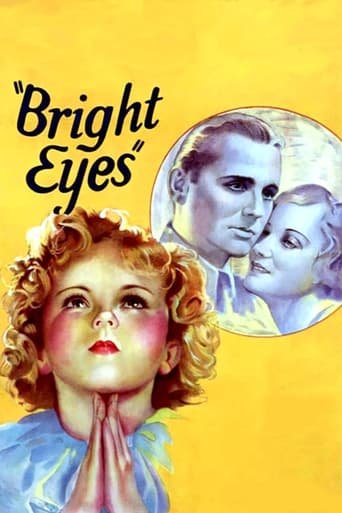weezeralfalfa
My review title contains a quote from Shirley, in response to pilot Loop questioning if she's OK. As the only passengers in Loop's small plane caught in a violent thunderstorm, Loop eventually decided they that he and stowaway Shirley must do a parachute jump with just his one chute(why?). They did so, with a hard landing in an open area on a mountain. Unfortunately, the violent wind then pulled the still-attached parachute toward a very high cliff, dragging them along, until Loop finally gets the harness free just before they are to be pulled over the cliff... Before this incident, Loop had taken little Shirley, with aspirations of becoming a pilot, high up in his plane, supposedly close to heaven, telling her that her mother was so lonely for her crash-killed father that she decided to join him in heaven. "You mean she cracked up, too" Shirley responded: one of the tear-jerking moments in the film....In another scene inside a plane, on the ground, she sings her classic "On the Good Ship Lollipop". The plot reflects Shirley's real life ambition to become a pilot. But at that time, she wasn't allowed in a flying plane, for insurance reasons.It's my contention that Shirley's core films represented, in large part, a talkie female equivalent of the silent Little Tramp. Like Chaplin's Tramp, she was in some ways child -like and in some ways adult-like, cast as being an isolated entity, usually in an unstable, marginal, family relationship, through no fault of her own. Unlike most families with children of the time, she was always cast as an only child and, in most films, interacted mostly or exclusively with adults: very different from the case in the contemporary "Our Gang" series. But, in contrast to the stereotypical spoiled bratty only child represented in the extreme by Jane Wither's character(Joy) in the present film, she was characterized as most valuing loving associations with adults who were unattached with other adults, seemingly lonely, but who found in her a kindred spirit, which brought to the surface a loving, caring, person.In this film, Shirley identifies with old Uncle Ned, and he with her, despite he being generally grouchy, demanding, and wheelchair-bound. , because they are both forced to live in this household as outsiders of the nuclear family(Smythes), not loved by any of its members(especially Joy). Ultimately, this relationship appears to work out for the benefit of both. But , there is the important complicating factor of flier Loop(James Dunn), who is her best friend, godfather, and surrogate father, having been the best friend of her deceased father. He also insists that he can take care of Shirley, with the sudden death her mother on Christmas day. Thus, we have a court battle between Uncle Ned and Loop over which, if either, will become Shirley's legal guardian. Shirley is very lucky that the judge decides to make her desire paramount in his decision. In choosing Loop, plus his estranged girlfriend, plus Uncle Ned, she, along with the judge, apparently solve the problem, by declaring that the 3 live together with Shirley, leaving the arrogant, mean, greedy Smythes holding the bag(cut out of Uncle Ned's inheritance. It's wonder they hadn't poisoned him by now!). Unfortunately, given the animosity recently shown between Loop and Uncle Ned, and between Loop and his estranged girlfriend, this arrangement realistically looks awfully forced, perhaps likely to fragment soon. But, it might work, given Shirley's glue.Jane Withers, as the Smythe's seemingly psychopathic daughter, ironically named Joy, gives a riveting portrayal, for the times, of a spoiled brat of a well-to-do family. Clearly, Joy enjoys cruelty and negativity, as evidenced by the bossy treatment of much smaller Shirley, her dismemberment of her former doll, which Shirley found in the trash, a penchant for imagining she is killing people with a machine gun(her requested Christmas present), her constant spanking of her dolls, and her purposeful irritating of Uncle Ned. True, these behaviors aren't that unusual in this culture for boys, but not girls. she immediately throws away or breaks her Christmas gifts, claiming she only wanted a wheelchair like Uncle Ned's(presumably so others would treat her with more kindness, and as a very unexpected novelty)...At one point, Shirley turns the tables on Joy, when the later tries to wreck Shirley's baby carriage, with a vigorous side collision with her own carriage. But, Shirley pulls her carriage out of the line of fire at the last moment, causing Joy's carriage to smash into a stone wall, sending her and her carriage sprawling. This has to be the most satisfying moment in the film!. Of course, Joy claimed that Shirley(much smaller) pushed her down. The second most satisfying moment is the ending.Reportedly, screenwriter and director David Butler got the idea for Shirley and her mother living in the home of their employer from his own experience as a child. This was the first of 4 Shirley-starring films that Butler directed. In a directing career that spanned more than 40 years, It's not surprising to learn that he directed TV's "Leave it to Beaver". While at Warner, he also directed some of Bob Hope's classic comedies, and some of Doris Day's early musicals.This was the last of 3 films featuring Shirley, in which James Dunn played her surrogate or actual father. While lacking the physical charisma of some of her later male leads, obviously he had great rapport with Shirley, with modest musical and comedic talent(check out "Baby Take a Bow"). Unfortunately, with the merger of Fox and Twentieth Century in 1935, he was reassigned, and a few years later developed a chronic drinking problem.
ccthemovieman-1
Even though there is very little singing and dancing, which is a big part of the appeal of Shirley Temple, it's still a solid film.This was the first movie in which was Shirley was the big star, I believe, and you can see why she quickly won the hearts of Americans.Although there is only one song, it's perhaps her most famous: "On the Good Ship Lollipop." The rest of the film is almost as charming as that song with many sweet, touching moments that made her films so endearing.It also helped to have James Dunn as the male lead. Dunn was one of the more likable guys in classic Hollywood, on and off the screen. He and Shirley make a great pair. Other interesting people to watch in this movie are the crabby old grandfather, played by Charles Sellon; the spoiled brat played by Jane Withers, who is so bad she's funny and an assortment of other characters from fliers to cooks to old girlfriends.The only negative is the ending. It looked like they didn't know how to end this, so they rushed to finish it without much thought. Oh, well, the main thing is Shirley's charm.....and that's there in abundance.
Ron Oliver
Little BRIGHT EYES wins the hearts & changes the lives of a lonely aviator and a cranky old coot.This movie was a very big hit for Shirley Temple, who certainly deserved all the attention: she is adorable. Although the film tends to lag into melodramatics during the final half hour, Shirley brightens everything considerably when she appears. With her undeniable talent & elfin smile, it's easy to see why she became Hollywood's top box office star.However, the Mighty Mite does have competition. Jane Withers is on hand as the Ultimate Brat, a dreadful child who likes to play with imaginary machine guns and amputate body parts off of dolls. Although she looks alarmingly like OUR GANG's Alfalfa in drag, Withers is wonderful and the perfect antidote for those who may find Miss Temple a tad bit icky sticky. To say that Miss Withers practically plunders the picture from The Moppet is high praise, indeed.James Dunn appeared in four films with Shirley in 1934; in BRIGHT EYES he has his finest scenes with her. As her dead father's best buddy, Dunn is quite touching in his devotion to the child. Elderly character actor Charles Sellon has some funny scenes as a most obstreperous old blister. His contempt for Miss Withers is a joy to behold.Jane Darwell was always a welcome addition to any cast; here she plays a lovable Irish cook. Brandon Hurst as her prim English butler husband, Judith Allen as Dunn's love interest, Lois Wilson as Shirley's doomed mother, and Theodore von Eltz & Dorothy Christy as Withers' pestilential parents all add to the movie's enjoyment.Shirley sings what was to become her signature song - ‘On The Good Ship Lollipop' - and it is a highlight of the film. Many first time viewers, having heard the song all their lives, may be surprised to learn it's about a plane, not a boat - in this case, from American Airlines.




